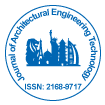మా గ్రూప్ ప్రతి సంవత్సరం USA, యూరప్ & ఆసియా అంతటా 3000+ గ్లోబల్ కాన్ఫరెన్స్ ఈవెంట్లను నిర్వహిస్తుంది మరియు 1000 కంటే ఎక్కువ సైంటిఫిక్ సొసైటీల మద్దతుతో 700+ ఓపెన్ యాక్సెస్ జర్నల్లను ప్రచురిస్తుంది , ఇందులో 50000 మంది ప్రముఖ వ్యక్తులు, ప్రఖ్యాత శాస్త్రవేత్తలు ఎడిటోరియల్ బోర్డ్ సభ్యులుగా ఉన్నారు.
ఎక్కువ మంది పాఠకులు మరియు అనులేఖనాలను పొందే ఓపెన్ యాక్సెస్ జర్నల్స్
700 జర్నల్స్ మరియు 15,000,000 రీడర్లు ప్రతి జర్నల్ 25,000+ రీడర్లను పొందుతున్నారు
ఇండెక్స్ చేయబడింది
- ఇండెక్స్ కోపర్నికస్
- గూగుల్ స్కాలర్
- షెర్పా రోమియో
- J గేట్ తెరవండి
- జెనామిక్స్ జర్నల్సీక్
- అకడమిక్ కీలు
- ఎలక్ట్రానిక్ జర్నల్స్ లైబ్రరీ
- RefSeek
- హమ్దార్డ్ విశ్వవిద్యాలయం
- EBSCO AZ
- OCLC- వరల్డ్ క్యాట్
- SWB ఆన్లైన్ కేటలాగ్
- వర్చువల్ లైబ్రరీ ఆఫ్ బయాలజీ (విఫాబియో)
- పబ్లోన్స్
- యూరో పబ్
ఉపయోగకరమైన లింకులు
యాక్సెస్ జర్నల్స్ తెరవండి
ఈ పేజీని భాగస్వామ్యం చేయండి
నైరూప్య
CQC as an Element of Aesthetic Control in Research of Architectural Space
Marynczuk IAP
Contemporary architecture is characterised by immense diversity of technical and technological solutions, in particular as regards aesthetics and composition. The moment we mastered the methods of safe erection of edifices, the problem of useable and aesthetic quality emerged. The composition quality control (CQC) is an original method of organising the issues related to deformation of architectural space by an analytical tool and it aims at analysing the space in the context of its designing and transformation. One may prove that space should be composed in a certain way for certain purposes and following certain pre-determined goals so that its form is not random. Composition is an extremely significant stage of creation – success of any project depends on the knowledge of its rules (on observing them or consciously violating them). Despite its vital role, composition is frequently marginalized and seen as a set of rigid, dead rules. This paper will argue that this is a misconception and the knowledge of theory is the key to conscious application of various elements of spatial composition and it helps in a truly creative process.
సబ్జెక్ట్ వారీగా జర్నల్స్
- ఆహారం & పోషకాహారం
- ఇంజనీరింగ్
- ఇన్ఫర్మేటిక్స్
- ఇమ్యునాలజీ & మైక్రోబయాలజీ
- ఎకనామిక్స్ & అకౌంటింగ్
- కంప్యూటర్ సైన్స్
- కెమికల్ ఇంజనీరింగ్
- క్లినికల్ సైన్సెస్
- గణితం
- జనరల్ సైన్స్
- జియాలజీ & ఎర్త్ సైన్స్
- జెనెటిక్స్ & మాలిక్యులర్ బయాలజీ
- నర్సింగ్ & హెల్త్ కేర్
- పర్యావరణ శాస్త్రాలు
- ఫార్మాస్యూటికల్ సైన్సెస్
- బయోకెమిస్ట్రీ
- బయోమెడికల్ సైన్సెస్
- భౌతిక శాస్త్రం
- మెటీరియల్స్ సైన్స్
- మెడికల్ సైన్సెస్
- రసాయన శాస్త్రం
- వెటర్నరీ సైన్సెస్
- వ్యాపార నిర్వహణ
- సామాజిక & రాజకీయ శాస్త్రాలు
క్లినికల్ & మెడికల్ జర్నల్స్
- అంటు వ్యాధులు
- అణు జీవశాస్త్రం
- అనస్థీషియాలజీ
- ఆరోగ్య సంరక్షణ
- ఆర్థోపెడిక్స్
- కార్డియాలజీ
- క్లినికల్ రీసెర్చ్
- గ్యాస్ట్రోఎంటరాలజీ
- జన్యుశాస్త్రం
- టాక్సికాలజీ
- డెంటిస్ట్రీ
- డెర్మటాలజీ
- నర్సింగ్
- నెఫ్రాలజీ
- నేత్ర వైద్యం
- నేత్ర వైద్యం
- న్యూరాలజీ
- పల్మోనాలజీ
- పీడియాట్రిక్స్
- పునరుత్పత్తి ఔషధం
- ఫిజికల్ థెరపీ & పునరావాసం
- మందు
- మధుమేహం & ఎండోక్రినాలజీ
- మనోరోగచికిత్స
- మైక్రోబయాలజీ
- రేడియాలజీ
- రోగనిరోధక శాస్త్రం
- సర్జరీ
- హెమటాలజీ

 English
English  Spanish
Spanish  Chinese
Chinese  Russian
Russian  German
German  French
French  Japanese
Japanese  Portuguese
Portuguese  Hindi
Hindi